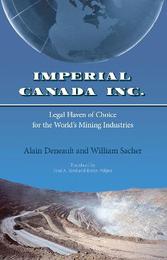
|
Imperial Canada Inc.: Legal Haven of Choice for the World's Mining Industries
Paperback / softback
Main Details
| Title |
Imperial Canada Inc.: Legal Haven of Choice for the World's Mining Industries
|
| Authors and Contributors |
By (author) Alain Deneault
|
|
By (author) William Sacher
|
| Physical Properties |
| Format:Paperback / softback | | Pages:256 | | Dimensions(mm): Height 216,Width 140 |
|
| ISBN/Barcode |
9780889226357
|
| Classifications | Dewey:343.71077 |
|---|
| Audience | |
|---|
|
Publishing Details |
| Publisher |
Talon Books,Canada
|
| Imprint |
Talon Books,Canada
|
| Publication Date |
15 March 2011 |
| Publication Country |
Canada
|
Description
Imperial Canada Inc. sets out to ask a simple question: why is Canada home to more than 70% of the world's mining companies? Created by the British North America Act of 1867, Canada, rather than turning away from its colonial past, actively embraced, appropriated, and perpetuated the imperial ambitions of its mother country. Two years later, it took possession of Rupert's Land all of the land draining into Hudson Bay and the North West Territories from the Hudson's Bay Company, 3 million square miles of resources, and set about its nation-building enterprise of extending its Dominion "from sea to sea." This Canadian imperial heritage continues to offer the extractive sector worldwide a customized trading environment that: supports speculation, enables capital flows to finance questionable projects abroad, pursues a pro-active diplomacy which successfully promotes this sector to international institutions, opens fiscal pipelines to Caribbean tax havens, provides government subsidies, and most especially, offers a politicized legal haven from any risk of litigious recourse attempted by any community seriously affected by these industries. Traditionally rooted in Canadian law, the right to reputation effectively supersedes freedom of expression and the public's right to information. Hence, Canadian "bodies corporate," i.e. Canadian-based corporations, can sue for "libel" any and all persons or legal entities that quote documents or generate analyses of their corporate practices that they do not approve of. Even foreign academics have become hesitant about presenting their work in Canada for fear of such prosecution. The authors of Imperial Canada Inc., all respected scholars in their fields, meticulously research four factors that contribute to the answer to this question: Quebec's and Ontario's mining codes; the history of the Toronto Stock Exchange; Canada's involvement with Caribbean tax havens; and, finally, Canada's official role of promoting itself to international institutions governing the world's mining sector.
Author Biography
Alain Deneault Alain Deneault was born in the Outaouais region of Quebec. His interests lie in nineteenth-century German and twentieth-century French philosophy, as well as the work of Georg Simmel. Deneault's research and writing practices are diverse and often collaborative, focusing on how international financial and legal agreements increasingly foster the interests of "stateless" transnational corporations over those of nation states and the interests of their human communities. Fred A. Reed International journalist and award-winning literary translator Fred A. Reed is also a respected specialist on politics and religion in the Middle East. After several years as a librarian and trade union activist at the Montreal Gazette, Reed began reporting from Islamic Iran in 1984, visiting the Islamic Republic thirty times since then. He has also reported extensively on Middle Eastern affairs for La Presse, CBC Radio-Canada and Le Devoir. Reed is a three-time winner of the Governor General's Award for translation. Robin Philpot Montreal-based author and translator Robin Philpot attained degrees in history and literature from the University of Toronto, taught English and History in Africa, and returned to Canada to pursue a career in Quebec politics. He sparked public controversy with the on-line release of his book, Rwanda 1994: Colonialism Dies Hard.
|